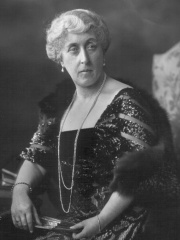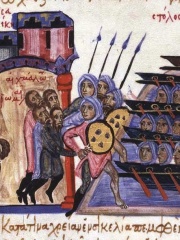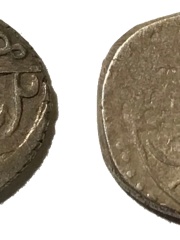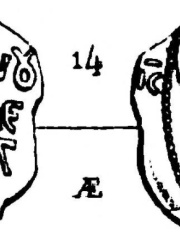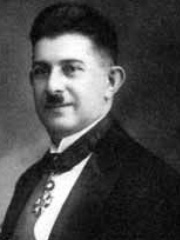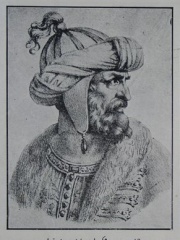POLITICIAN
Dolon
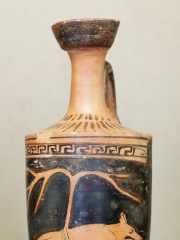
 Dolon
Dolon
In Greek mythology, Dolon (Ancient Greek: Δόλων, gen.: Δόλωνος) fought for Troy during the Trojan War. He volunteered to spy on the Greek camp at the request of Hector, but was captured by Diomedes and Odysseus. Read more on Wikipedia
His biography is available in 25 different languages on Wikipedia. Dolon is the 8,952nd most popular politician (down from 7,150th in 2024), the 751st most popular biography from Türkiye (down from 636th in 2019) and the 367th most popular Turkish Politician.
Memorability Metrics
Page views of Dolon by language
Among POLITICIANS
Among politicians, Dolon ranks 8,952 out of 19,576. Before him are Sergei Ivanovich Mosin, Larry Hogan, Princess Helena Victoria of Schleswig-Holstein, Franz von Sickingen, Roger de Moulins, and Henry V, Count Palatine of the Rhine. After him are Princess Marie of Waldeck and Pyrmont, James I of Cyprus, Marcus Licinius Crassus, James Marape, Abdalla Hamdok, and Basarab II of Wallachia.
Most Popular Politicians in Wikipedia
Go to all RankingsSergei Ivanovich Mosin
1849 - 1902
HPI: 62.32
Rank: 8,951
Larry Hogan
1956 - Present
HPI: 62.32
Rank: 8,952
Princess Helena Victoria of Schleswig-Holstein
1870 - 1948
HPI: 62.32
Rank: 8,953
Franz von Sickingen
1481 - 1523
HPI: 62.32
Rank: 8,954
Roger de Moulins
1200 - 1187
HPI: 62.32
Rank: 8,955
Henry V, Count Palatine of the Rhine
1173 - 1227
HPI: 62.31
Rank: 8,956
Dolon
HPI: 62.31
Rank: 8,957
Princess Marie of Waldeck and Pyrmont
1857 - 1882
HPI: 62.31
Rank: 8,958
James I of Cyprus
1334 - 1398
HPI: 62.31
Rank: 8,959
Marcus Licinius Crassus
50 BC - 50 BC
HPI: 62.31
Rank: 8,960
James Marape
1971 - Present
HPI: 62.30
Rank: 8,961
Abdalla Hamdok
1956 - Present
HPI: 62.30
Rank: 8,962
Basarab II of Wallachia
1450 - 1458
HPI: 62.30
Rank: 8,963
In Türkiye
Among people born in Türkiye, Dolon ranks 751 out of 1,347. Before him are Hermogenes of Priene (-200), Theon of Smyrna (70), Severus of Antioch (456), Germanus V of Constantinople (1835), Alcidamas (-450), and Constantine Manasses (1130). After him are Leo of Tripoli (900), Gainas (400), Lala Şahin Pasha (1330), Mustafa Çelebi (1380), Kıvanç Tatlıtuğ (1983), and Modestus of Jerusalem (537).
Others born in Türkiye
Go to all RankingsHermogenes of Priene
ARCHITECT
200 BC - 200 BC
HPI: 62.35
Rank: 745
Theon of Smyrna
MATHEMATICIAN
70 - 135
HPI: 62.34
Rank: 746
Severus of Antioch
RELIGIOUS FIGURE
456 - 538
HPI: 62.34
Rank: 747
Germanus V of Constantinople
RELIGIOUS FIGURE
1835 - 1920
HPI: 62.33
Rank: 748
Alcidamas
PHILOSOPHER
450 BC - 350 BC
HPI: 62.32
Rank: 749
Constantine Manasses
WRITER
1130 - 1187
HPI: 62.32
Rank: 750
Dolon
POLITICIAN
HPI: 62.31
Rank: 751
Leo of Tripoli
MILITARY PERSONNEL
900 - 1000
HPI: 62.30
Rank: 752
Gainas
MILITARY PERSONNEL
400 - 401
HPI: 62.29
Rank: 753
Lala Şahin Pasha
MILITARY PERSONNEL
1330 - 1382
HPI: 62.26
Rank: 754
Mustafa Çelebi
POLITICIAN
1380 - 1422
HPI: 62.25
Rank: 755
Kıvanç Tatlıtuğ
ACTOR
1983 - Present
HPI: 62.24
Rank: 756
Modestus of Jerusalem
RELIGIOUS FIGURE
537 - 634
HPI: 62.24
Rank: 757
Among POLITICIANS In Türkiye
Among politicians born in Türkiye, Dolon ranks 367. Before him are Manuel II of Trebizond (1324), Andriscus (-185), Subhi Bey Barakat (1889), Ariobarzanes of Pontus (-250), Arame of Urartu (-900), and Manuel III of Trebizond (1364). After him are Mustafa Çelebi (1380), Danishmend Gazi (1100), Lucia, Countess of Tripoli (1265), Isaac Komnenos (1113), Ada of Caria (-400), and Amcazade Köprülü Hüseyin Pasha (1644).
Manuel II of Trebizond
1324 - 1333
HPI: 62.46
Rank: 361
Andriscus
185 BC - 146 BC
HPI: 62.43
Rank: 362
Subhi Bey Barakat
1889 - 1939
HPI: 62.42
Rank: 363
Ariobarzanes of Pontus
250 BC - 250 BC
HPI: 62.41
Rank: 364
Arame of Urartu
900 BC - 844 BC
HPI: 62.40
Rank: 365
Manuel III of Trebizond
1364 - 1417
HPI: 62.36
Rank: 366
Dolon
HPI: 62.31
Rank: 367
Mustafa Çelebi
1380 - 1422
HPI: 62.25
Rank: 368
Danishmend Gazi
1100 - 1104
HPI: 62.18
Rank: 369
Lucia, Countess of Tripoli
1265 - 1299
HPI: 62.17
Rank: 370
Isaac Komnenos
1113 - 1154
HPI: 62.16
Rank: 371
Ada of Caria
400 BC - 326 BC
HPI: 62.11
Rank: 372
Amcazade Köprülü Hüseyin Pasha
1644 - 1702
HPI: 62.09
Rank: 373


